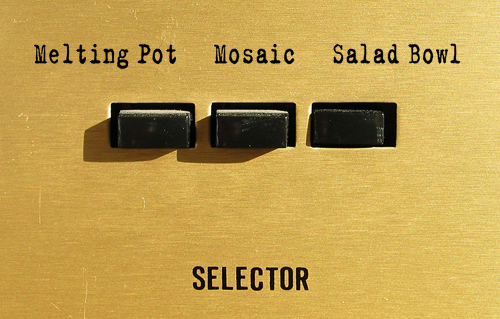
The Council of Europe is in the process of producing a »White Paper on Intercultural Dialogue«. (See the guidelines for the drawing up of the White Paper).
Wonderful! Everyone loves intercultural dialogue! It is the solution for fighting terrorism, it enhances social inclusion, and everyone is nice to each other and will respect each other’s worldview. Wouldn’t it be great if it was that easy?
But what is intercultural dialogue, actually? A very difficult question and so far no one has provided a satisfying answer. This white paper will have to. At least it will have to come up with a working definition. The authors will in the beginning of the paper need to include something like
for the purpose of this white paper intercultural dialogue will refer to a communication process between people who, on the basis of their socialisation have diverging sets of values…
Otherwise anyone can take the white paper and instrumentalise it for their own purpose, whether or not that is in line with the values upon which the Council of Europe was founded.
Another aspect of Intercultural Dialogue that will have to be taken into account is the one of ascribed identity and representation. When I recently made an intervention in a discussion about the White Paper, I was referred to as “the young colleague”. I found this discriminating because I believed that being young is not something that would, in this context, have anything to do with my identity and with the role I was playing. However, apparently for the person who referred to my intervention “being young” was something that would describe me sufficiently in that context.
What I want to illustrate with this is the danger of ascribing a certain identity to someone with whom one is in a dialogue with. Individuals are very complex and reducing them to only one cultural membership is simply not good enough. Furthermore, “cultures” are not democratic groups, which elect representatives who can speak on their behalf. Whenever someone is invited to participate in an intercultural dialogue on behalf of a certain “culture”, the question of whom this person is actually entitled to represent has to be asked.
Some other questions are also important…
How much can be discussed in an intercultural dialogue? Are human rights negotiable? Can someone, and especially the Council of Europe, engage in intercultural dialogue, with the aim of fostering mutual respect, if the partner refuses to accept human rights? What are the boundaries? When does tolerance become ignorance and dialogue harmful to those whose rights are disrespected?

I believe that engaging in intercultural dialogue is also about having an opinion and knowing why one has that opinion. Being able to argue one’s case and being able to agree to disagree are crucial in an honest Intercultural Dialogue that can lead to a mutual understanding and respect for each other. Human Rights are not negotiable. A friend once put it nicely by saying
The right to spin around with outstretched arms stops there where the nose of the person next to one begins.
A White Paper on a field that is not yet a traditional policy field and is not clearly defined is in so far problematic as it can become another piece of wood in the fire that let’s Huntington’s ideas of a clash of civilizations boil (too) loud and strong these days.
If the White Paper will be based on a clear working definition that takes into account multiple cultural memberships and complex identities, if it provides an action plan to make European societies more inclusive and places where everyone’s voice is heard and taken seriously — then it can become a great tool. However, in the same way that certain kinds of exercises in intercultural learning can enhance prejudice, so could this white paper.
Care that this does not happen will have to be taken.
Comments
8 responses to “A white paper on what?”
Btw: The picture of the two cows is courtesy of Scoobymoo over at Flickr.
I am aware that when voicing a critique about the absence of a working definition of intercultural dialogue it would be appropriate to offer one myself. However, I believe that those actually writing the paper should elaborate the working definition. But, discussing this issue here might certainly help everyone who’s involved in this process. Any opinion and any offer of a working definition are welcome!
In relation to the topic of the article, a resolution of the Council of Europe’s Committee of Ministers on Intercultural Dialogue and Conflict Resolution from October 2003.
Let’s look for a moment at the UNESCO Project on Intercultural Dialogue, which has only come to the conclusion so far that the term «Intercultural Dialogue» needs to be further clarified and defined.
Wikipedia has no entry on the term. Same for Encyclopædia Britannica.
And while it is expected that the European Commission declares 2008 to be the «European Year of Intercultural Dialogue», they don’t really say what it is exactly either.
We are in prominent company. At least…
Hehe, search long enough and you find, well, something.
From the declaration cited above:
May be it would help to start thinking about the term dialogue first?
Take David Bohm’s understanding, for instance:
Or, as a contrast, Paolo Freire:
Or take Martin Buber:
To you.
About the complexity of identities: may I recommend a very interesting book : “Le mythe de l’identité – Apologie de la dissociation” – Especially the part written by Patrick Boumard, an Education anthropologist, is dealing with the concept of a “normal” identity in opposition to dissociated, complex identity, which has been – and often still is – seen as something pathological. The central role of school in creating the illusion of identity as something monolithic, straight and contradictionfree is analysed as well. I found it very interesting to analyse this further in relation to migration and “integration”, to the way a society defines herself and thus wants to define the Other. Here the references of the book and the french text of the Editor’s presentation:
“Le Mythe de l’identité – Eloge de la dissociation”
Patrick Boumard, Georges Lapassade, Michel Lobrot, Remi Hess
Sept 2006, Economica. ISBN: 2717852484
“Non seulement les humains sont différents entre eux, mais ils sont différents à l’intérieur d’eux-mêmes, intrinsèquement. Ils sont soumis à des variations incessantes. Ils sont pétris d’oppositions et de contradictions internes. Telle est la thèse de ce livre, développée par trois chercheurs en sciences humaines. L’un analyse les séparations et ruptures opérées par les jeunes pour survivre dans un monde aliénant. L’autre étudie les phénomènes de chamanisme où l’aspect de dissociation est saillant et joue un rôle social essentiel. Le troisième approfondit les bases psychologiques et sociologiques de la thèse sur la dissociation. Autant dire qu’ils réfutent les tentatives, courantes aujourd’hui, pour enfermer les gens dans des formules identitaires trompeuses, avec accusations de communautarisme par exemple, qui permettent de les rejeter. Une thèse comme celle-ci pourrait paraître pessimiste, en fragmentant et faisant éclater le psychisme. Il n’en est rien. Le phénomène de dissociation oblige le psychisme à se construire lui-même dans des formules qu’il doit inventer, à partir de données disparates et multiples. Cette conclusion s’inscrit dans la ligne des conceptions constructivistes, très vivantes aujourd’hui dans différents domaines de la pensée.”
There is a distinction to be drawn between intercultural conversation aimed at understanding the substance of one another’s point of view and the differences between the outlooks of the parties, and a dialogue that may aim further at finding.contriving common ground (or policy recommendations) rooted in different cultural starting points.
In my experience of something which might be called intercultural dialogue (regarding the relationship between human rights law and Islamic law), I found it useful in the first place to agree to set aside areas of fundamental disagreement (an example in this case was whether capital punishment can ever be supported) and either agree to disagree or agree to reserve such discussion for later when some exchange of ideas had already taken place. This doesn’t necessarily make the substance of fundamental disagreements easier to deal with, nor does it resolve the eventual tension between the respect-for-minorities principle and unwillingness to compromise on certain other principles, but more progress may be made than would otherwise be possible. This of course presupposes that ‘progress’ or synthesis are the aim of intercultural dialogue, which brings us back to the lack of a definition…